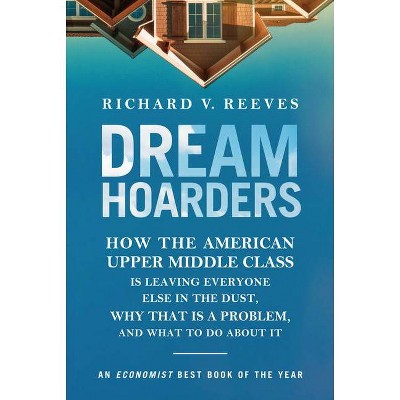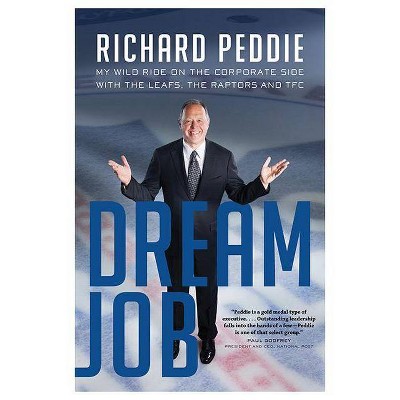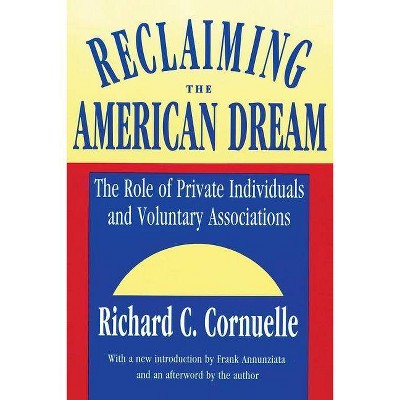Dream Hoarders - by Richard V Reeves (Paperback)

Similar Products
Products of same category from the store
AllProduct info
<p/><br></br><p><b> About the Book </b></p></br></br>"In America, everyone knows that the top 1 percent are the villains. The rest of us, the 99 percent?we are the good guys. Not so, argues Reeves. The real class divide is not between the upper class and the upper middle class: it is between the upper middle class and everyone else. The separation of the upper middle class from everyone else is both economic and social, and the practice of "opportunity hoarding"?gaining exclusive access to scarce resources?is especially prevalent among parents who want to perpetuate privilege to the benefit of their children. While many families believe this is just good parenting, it is actually hurting others by reducing their chances of securing these opportunities. There is a glass floor created for each affluent child helped by his or her wealthy, stable family. That glass floor is a glass ceiling for another child. Throughout Dream Hoarders, Reeves explores the creation and perpetuation of opportunity hoarding, and what should be done to stop it, including controversial solutions such as ending legacy admissions to school. He offers specific steps toward reducing inequality and asks the upper middle class to pay for it. Convinced of their merit, members of the upper middle class believes they are entitled to those tax breaks and hoarded opportunities. After all, they aren't the 1 percent. The national obsession with the super rich allows the upper middle class to convince themselves that they are just like the rest of America. In Dream Hoarders, Reeves argues that in many ways, they are worse, and that changes in policy and social conscience are the only way to fix the broken system" -- publisher's description.<p/><br></br><p><b> Book Synopsis </b></p></br></br><p><i>Dream Hoarders</i> sparked a national conversation on the dangerous separation between the upper middle class and everyone else. Now in paperback and newly updated for the age of Trump, Brookings Institution senior fellow Richard Reeves is continuing to challenge the class system in America.</p><p>In America, everyone knows that the top 1 percent are the villains. The rest of us, the 99 percent--we are the good guys. Not so, argues Reeves. The real class divide is not between the upper class and the upper middle class: it is between the upper middle class and everyone else.</p><p>The separation of the upper middle class from everyone else is both economic and social, and the practice of "opportunity hoarding"--gaining exclusive access to scarce resources--is especially prevalent among parents who want to perpetuate privilege to the benefit of their children. While many families believe this is just good parenting, it is actually hurting others by reducing their chances of securing these opportunities. There is a glass floor created for each affluent child helped by his or her wealthy, stable family. That glass floor is a glass ceiling for another child.</p><p>Throughout <i>Dream Hoarders</i>, Reeves explores the creation and perpetuation of opportunity hoarding, and what should be done to stop it, including controversial solutions such as ending legacy admissions to school. He offers specific steps toward reducing inequality and asks the upper middle class to pay for it.</p><p>Convinced of their merit, members of the upper middle class believes they are entitled to those tax breaks and hoarded opportunities. After all, they aren't the 1 percent. The national obsession with the super rich allows the upper middle class to convince themselves that they are just like the rest of America. In <i>Dream Hoarders</i>, Reeves argues that in many ways, they are worse, and that changes in policy and social conscience are the only way to fix the broken system.</p><p/><br></br><p><b> Review Quotes </b></p></br></br><br><p>"An important new perspective on equality and mobility from one of America's best-informed and most articulate commentators on that topic. Reeves provocatively turns the current policy debate upside down--not "how do we increase upward mobility?" but "how do we increase downward mobility?" Certain to enliven dinner party conversations among America's upper-middle class elite--so if you are in that group, this book is a must-read."--Robert D. Putnam, Harvard University, author of <i>Our Kids: The American Dream in Crisis</i></p><br><br><p>"For decades, economists have worried about the western "poverty trap". But as Reeves shows, the "wealth trap" is every bit as sticky. It is harder to fall out of wealth in the US than it is in almost any other western democracy, Britain included."--<i>FInancial Times</i></p><br><br><p>"In the 2016 presidential campaign, Bernie Sanders claimed "the system is rigged." Brookings Institution fellow Richard Reeves doesn't disagree with that statement, though he takes issue with where the rigging occurs. For Reeves, it's not the top 1 percent but rather the rest of the top quintile--his "upper middle class"--that has garnered the lion's share of the income gains and has worked hard to protect its position in society. Recommended."--<i>CHOICE</i></p><br><br><p>"Reading Richard Reeves on social mobility is like going for a good walk: he is bracing, head clearing, and ultimately inspiring. With rigor and wit, his new book shows how millions of successful, hardworking Americans, often with the best of intentions, have helped build a society where birth matters more than brilliance. Impassioned, data-driven, and focused on practical solutions, <i>Dream Hoarders</i> is a fine cure for an age of stale, cynical politics."--David Rennie, <i>The Economist</i></p><br><br><p>"Recently, scholars and social activists have set off alarm bells about the rising concentration of income among the top 1 percent. Richard Reeves urges us to turn our attention to a wider slice of affluent Americans--the top fifth--and the result is a devastating empirical portrait of damage done to "the bottom eighty." This captivating and stirring book is likely to make many of its readers uncomfortable."--Janet C. Gornick, Professor of Political Science and Sociology, Graduate Center, City University of New York, and Director, Stone Center on Socio-Economic Inequality</p><br><br><p>"Reeves's argument is seductive because it starts with some understated truths."--<i>The New Republic</i></p><br><br><p>"Richard Reeves has long been one of the most authoritative, insightful, and sage voices on the big questions gripping modern societies. Here he tackles one of the most urgent--inequality and how to solve it--and comes up with serious answers."--Jonathan Freedland, <i>The Guardian</i></p><br><br><p>"Richard Reeves's new book offers a trenchant diagnosis of the economic disparities that separate upper-middle-class Americans from those in the working class."--<i>The National Review</i></p><br><br><p>"Warning: Reeves's book will challenge some of your assumptions, no matter what your views are. And he shows how innocent or even admirable actions in particular spheres can reinforce existing hierarchies. <i>Dream Hoarders</i> will shake you up, teach you a lot, and make you think much harder."--E.J. Dionne Jr., Author of <i>Why the Right Went Wrong</i> and <i>Our Divided Political Heart</i></p><br><br><p>"We have met the enemy, and he is us: we who were smart enough to pick the right parents and now occupy the high ground in post-industrial America. Richard Reeves and I differ on specifics, but <i>Dream Hoarders</i> rightly gets to the heart of things: if we treasure America's traditional civic culture and want to see it preserved for future generations, the upper middle class has to recognize how much responsibility it bears for the culture's plight and act accordingly. He makes that case brilliantly."--Charles Murray, American Enterprise Institute</p><br><p/><br></br><p><b> About the Author </b></p></br></br><p><b>Richard V. Reeves</b> is a senior fellow in Economic Studies and co-director of the Center on Children and Families at the Brookings Institution.</p>
Price History
Cheapest price in the interval: 12.69 on October 22, 2021
Most expensive price in the interval: 12.69 on December 20, 2021
Price Archive shows prices from various stores, lets you see history and find the cheapest. There is no actual sale on the website. For all support, inquiry and suggestion messages communication@pricearchive.us




















